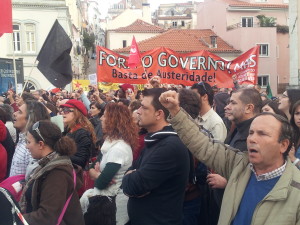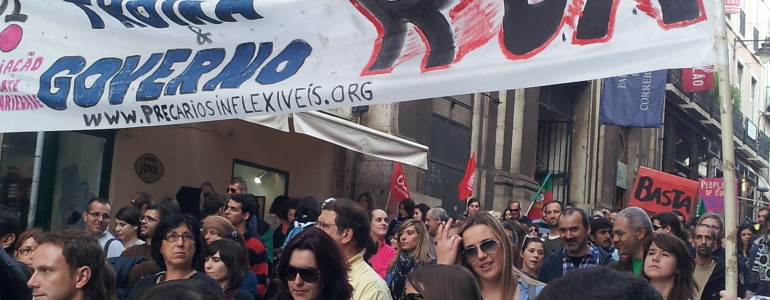Theaterpolitik of the Troika in Portugal
In this guest post João Camargo, an Anti-Troika activist and book author based in Lisbon, writes about turbulent times inside the ruling PSD-CDS coalition and how the government narrowly saved itself from ultimate collapse last week. He argues that further resistance to the Troika of ECB, EU and IMF can deliver the final blow to this illegitimate government.
Even soap opera writers couldn’t have come up with this: a Finance Minister resigns because he could not implement his blind and destructive policies, a Minister accused of lying in parliament takes his place, and the resignation of the leader of the minority coalition partner, the CDS-PP, follows. Then the Prime Minister turns around, refuses to accept the resignation and forces the Minister who had “irrevocably resigned” to come back. Democracy was yesterday. Politics is absent. Rational argument and behavior are nowhere to be found.
When Finance Minister Vitor Gaspar resigned last Monday, he openly admitted that he already had wanted to resign after the biggest demonstrations since 1974 Revolution in September 2012 and March of this year. He took responsibility for the recurring mistakes in the economic predictions. He went on to state that he lacked the political [will] strength to further implement the austerity measures prescribed by the Troika of ECB, EU and IMF. The austerity measures have been destroying Portugal and its people. Official unemployment lies at 17.6 per cent. In reality one and a half million people are unemployed, roughly 25 per cent. Public debt will stand at 138% at the end of 2013.
Gaspar reasoned that his departure would strengthen the government – the opposite came true. His friend, Prime Minister Passos Coelho, tried to calm the situation. But he failed miserably when he nominated State Treasurer Maria Luis Albuquerque to take his place. Albuquerque is no angel. For the last few months, she has been engulfed in a controversy over toxic financial swap operations during her time as the Financial Director of the state company REFER. She has been responsible for regulating this sector where she had major responsibilities and she oversaw the purchase of billions of Euros worth of toxic assets.
Out of nowhere Paulo Portas, the head of the minority coalition partner CDS-PP, dropped the atomic bomb by resigning as well. Without informing his own party’s leadership one week ahead of their congress he stated: “staying in government would constitute a cover-up”. To make matters worse, he defended his decision by pointing to the choice of Albuquerque as the new Finance Minister. Portas was only saving his own skin as he was supposed to present a new round of cuts worth 4.7bn Euros. This package of cuts has been delayed since February. Even Ministers in the Cabinet acknowledge that its postponement is due to the social struggles.
The recent teachers’ strike during national examinations successfully halted the government’s measures in education. The latest and fourth general strike against this government was supported by both union federations – the CGTP and UGT. It was one of the strongest days of action since the conservative CDS-PSD coalition took office. The popular support for the strike was overwhelming. Ironically, even the employers’ association argued that there were plenty of reasons for a shutdown.
“The markets have taught a lesson to the Portuguese”
 On July 2, it appeared that the Portuguese coalition government had finally died. The resignation of Gaspar and Portas would be the final blow after the resignation of Miguel Relvas (Second in command for the prime minister and Political Strategist of the PSD) earlier in April.
On July 2, it appeared that the Portuguese coalition government had finally died. The resignation of Gaspar and Portas would be the final blow after the resignation of Miguel Relvas (Second in command for the prime minister and Political Strategist of the PSD) earlier in April.
The stock markets plummeted and public outrage grew. Messages from European leaders emphasized the need to continue with the so-called reforms. President of the European Commission Manuel Barroso stated that there were signs of economic recovery in Portugal and that the government ought to remain in power. Where was this recovery?
When Prime Minister Coelho addressed the country in a public broadcast, he had to clarify that he would not resign and furthermore wouldn’t accept Portas’s resignation. The streets filled with jubilation at the demise of the government. The President of the Republic, Cavaco Silva, supported a resolution to continue the coalition and demanded that Coelho and Portas remain leaders in government.
The following day the stock market crashed in its biggest drop since 1998. Interest rates on government bonds rose from 3 to 8 per cent. The alarm bells were ringing. The media and the popular classes called for the resignation of the entire government and new elections. Portugal’s capitalists stood firm: No elections, no resignation. They followed this up with a second campaign: another bailout. This had precipitated the crisis in the first place yet would instill fear in the people.
Meanwhile Coelho flew out to Berlin on government business to comfort his puppet masters. Merkel assured him full support for the continuation of the austerity and the government’s policies. Protests calling for the government’s resignation happened throughout the week
From his office in Brussels, Barroso stated: “The markets have taught a lesson to the Portuguese”. If anything the recent days highlight the dominance of the markets. They are the ones who can choose when a government falls, or when you can have an election. Realpolitik was yesterday. In the age of the Troika you get Theaterpolitik where the popular classes are seemingly relegated to spectators.
A new deal?
 The PSD and CDS tried to patch-up the dying coalition only to be greeted by CGTP-organised protests on Saturday. In Lisbon, Porto and Funchal (Madeira) hundreds of protesters took to the streets calling for the resignation of the government and new elections. This comes after protests on March 2 when protesters took votes to dismiss the government in towns and cities across the country.
The PSD and CDS tried to patch-up the dying coalition only to be greeted by CGTP-organised protests on Saturday. In Lisbon, Porto and Funchal (Madeira) hundreds of protesters took to the streets calling for the resignation of the government and new elections. This comes after protests on March 2 when protesters took votes to dismiss the government in towns and cities across the country.
That evening the Prime Minister addressed the country once again. Portas stood next to him in silence. Coelho presented the new deal: Portas would become Vice Prime Minister and responsible for the economic policies, the negotiations with the Troika and the reform of the State; Albuquerque would take up her post as Finance Minister; Antonio Pires de Lima, a businessman in the CDS leadership was announced Minister of the Economy. The deal would now have to be ratified by the President of the Republic.
The junior coalition partner, the CDS-PP, has shown to be spineless and do anything to remain in power. Their congress has been postponed indefinitely. The party’s leaders are now under the dictat of the Troika. They seem to want to destroy their own party once and for all just so that Portas and a few of his friends consolidate their power.
Regime crisis
 Protesters surrounded the cars of the politicians and chased them through traffic once the negotiations had finished. Activists vow to continue with protests [this week] as the Portuguese people suffer at the hands of a decaying ruling coalition. Replacing democracy with subservience to the Troika hasn’t solved the regime crisis. Democracy’s incompatibility with austerity is now an incontestable fact. The following months are likely to see a rapid deterioration of the political, economic and social situation in Portugal.
Protesters surrounded the cars of the politicians and chased them through traffic once the negotiations had finished. Activists vow to continue with protests [this week] as the Portuguese people suffer at the hands of a decaying ruling coalition. Replacing democracy with subservience to the Troika hasn’t solved the regime crisis. Democracy’s incompatibility with austerity is now an incontestable fact. The following months are likely to see a rapid deterioration of the political, economic and social situation in Portugal.
All the government’s efforts to postpone new austerity measures so to shield itself from the shockwaves of mass protests haven’t worked. For the moment this dead government has been patched up. In the next few weeks the Troika will arrive in Portugal for its eight’s evaluation of the programme. This will exacerbate the political crisis. The social movements and trade unions will greet them just to send them home once and for all.
Reposted, with permission, from: http://mdbergfeld.com/2013/07/theaterpolitik-of-the-troika-in-portugal/
Left Unity is active in movements and campaigns across the left, working to create an alternative to the main political parties.
About Left Unity
Read our manifesto
Left Unity is a member of the European Left Party. 
Read the European Left Manifesto
ACTIVIST CALENDAR
Events and protests from around the movement, and local Left Unity meetings.

Saturday 10th January: No to Trump’s war on Venezuela
Protest outside Downing Street from 1 to 3pm.
More events »
GET UPDATES
Sign up to the Left Unity email newsletter.
CAMPAIGNING MATERIALS
Get the latest Left Unity resources.



